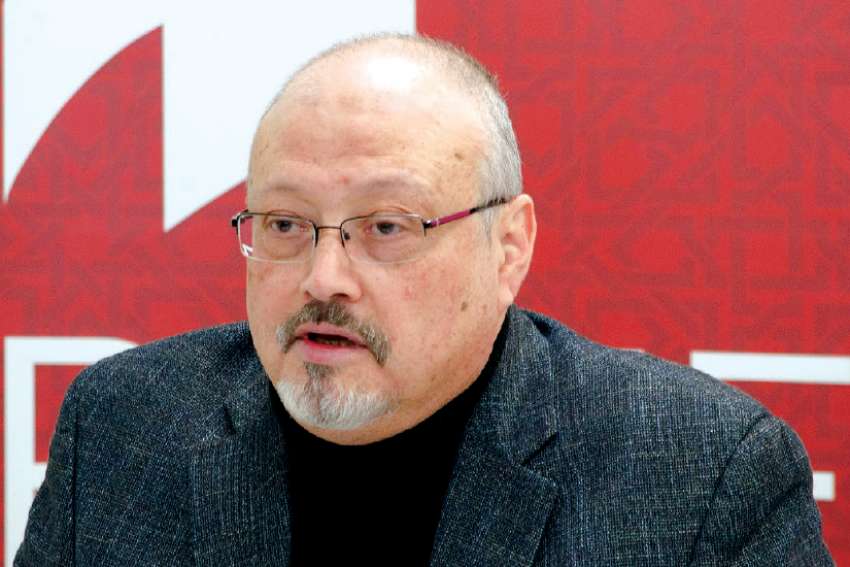Writing about truth’s “splendour” without discussing the Saudi government’s fabrications about the death of journalist Jamal Khashoggi would be ostrich-headed. As I sit at my computer, the Saudi story is that Khashoggi died in a fistfight in the Saudi embassy in Istanbul, Turkey. Eighteen people are being held responsible. It must have been quite the fistfight! Who knows what they’ll be saying by the time you read this article?
It’s rare that major nations do a tap dance around the truth so publicly. The exercise of oppressive power requires secrecy and authoritarian governments are experts in keeping secrets. Most often, governments are not so ham-fisted in organizing the disappearances of political dissenters. The Argentine military regime of the 1970s and ’80s simply threw its opponents out of helicopters over the Atlantic Ocean. That way no questions arose over the discovery of bullet-riddled bodies in shallow graves.
The Saudi government ranks third in the world in the use of the death penalty. More than 100 people were executed in the first six months of 2015 alone. Most executions — typically beheadings — are carried out in public.
Thus, government officials may not have considered that killing a journalist in the privacy of a foreign embassy would attract attention. Other than Amnesty International, no international bodies pay much heed to the steady flow of blood in Saudi Arabia’s village squares.
Now the Saudis have learned their lesson. In the future, they will be subtler in how they execute journalists and dissenters. And they will hire a battalion of communications experts who know how to prevent dirty deeds from entering the news cycle.
This time, their American friends bailed them out. President Donald Trump got tangled in his own web, lurching from his original claim that Khashoggi was slain by “rogue killers” to threatening “very serious” consequences for the Saudis if they were involved in the murder to answering “I do, I do” when asked if he thought the Saudi tale of the fistfight was credible.
Indeed, Saudi-U.S. relations are somewhat akin to a marriage and Trump was only renewing the vows that previous American administrations have made. The Americans need to maintain the myth that they are committed to freedom and democracy no matter how dubious that commitment sometimes is. When the world’s largest oil supplier gets its knickers in a knot, the United States is no longer the most powerful nation. It may need to grovel to protect the flow of cheap oil. An angry Saudi government is a threat to U.S. economic stability. The prospect of $150-a-barrel oil will convince American leaders to put their heads together with the Saudis to conjure up a “credible” story.
The term “plausible deniability” was coined by former U.S. Central Intelligence Agency head Allen Dulles in the 1950s as a strategy for keeping top elected officials in the dark about the CIA’s covert operations so they wouldn’t have to assume political responsibility. In the Khashoggi case, plausible deniability has been a matter of concocting a story which would keep responsibility for the journalist’s death at arm’s length from Saudi Crown Prince Mohammad.
When credibility and plausible deniability take precedence over the splendour of truth, we are living in a surreal world. Truth and the memory of it are essential to unmasking authoritarian power. Without truth, reality itself disappears. Truth is not, as some say today, an arbitrary construct; it is the basis of sanity.
Pope Francis’ message for the 2018 World Communications Day focused on fake news. In the message, the Pope quoted Russian novelist Fyodor Dostoyevsky: “People who lie to themselves and listen to their own lie come to such a pass that they cannot distinguish the truth within them, or around them, and so lose all respect for themselves and for others.”
When one is concerned more with credibility than with truth, one loses contact with reality. Is lying the first sin? No, it comes second. First, we perpetrate a grave evil and then, when confronted, we lie to hide our responsibility. As the number of questions increases, so does the web of lies. The splendour of truth becomes so caked with mud that its brilliance is no longer seen.
(Glen Argan is a Catholic journalist who lives in Edmonton.)


